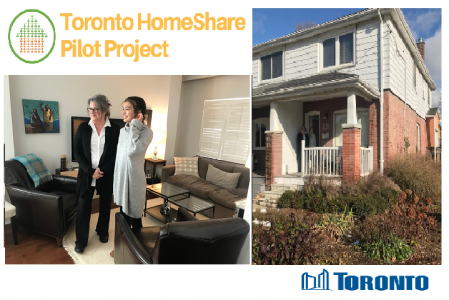Toronto HomeShare



Older adults are a significant and growing population in Canadian cities, and currently represent 25% of the residents of most major cities in developed countries. Concurrent with national and international demographic changes are housing challenges, accelerated by increased costs associated with buying/maintaining homes, and compounded by long wait times for retirement homes, long-term care and assisted-living residences. As such, there is a clear demographic imperative to address the needs of older adults in order to maintain their health, wellbeing, and independence in housing that meets their needs and preferences. Addressing the intersectionality of housing and quality-of-life, the Toronto Homeshare project linked older adults and post-secondary students together, with the goal of supporting older adults’ preference to remain in their homes and to age-in-place in the residence and community of their choice.
Although older adults are remaining longer in their homes, with limited housing options, they may do so at the expense of their personal, social or financial wellbeing. In order to address these issues as part of HomeShare, social workers facilitated the application and matching process, conducted home audits, and mediated any issues that arose. The project and associated tool-kit were designed to be easily replicable. The impact evaluation highlights the achievement of :1) reduced social isolation; 2) independent and autonomous seniors empowered to age-in-place; 3) reduced premature institutionalization ; 4) intergenerational relations fostered; and 5) housing affordability for seniors and increased access to affordable/attainable housing for students.
Website: https://homeshareto.ca/
Main target group: Both younger and older people (i.e. intergenerational)
Other target group(s): Vulnerable older adults (e.g., social isolation)
Sector(s): Health, Housing
Desired outcome for older people:
Build and maintain relationships